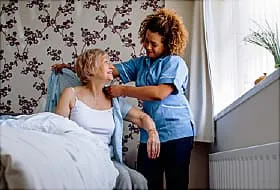You can make your recovery at home go a lot smoother if you take a little time to plan ahead. Ask your doctor what you won't be able to do at first while you're healing up, and get help from friends and family to prepare your living space.
Do I need to make changes to my house?

Stairs. If you can't climb up and down them after your surgery, you might have to make some changes. For instance, if your bedroom is upstairs, you may need to sleep on a lower floor for a while. Ask your friends or family to move your bed before you go into the hospital, or check into renting a hospital bed if you need it.
Stock your pantry. Ask your doctor if you have to stick to a certain diet. Make sure you're well supplied with the right food before you get back home.
Since you may feel tired during your recovery, prepare some meals before your operation and put them in the freezer.
Equipment. After some types of surgery, you'll need to get special gear at home. Plan ahead if your doctor tells you that you need oxygen tanks, elevated toilets, shower seats, supplies to care for your cut, or other items. Get in touch with your insurance company to see if they're part of your coverage.
How can I stay safe at home?
You need to be careful about falling after an operation. "People get dizzy because they haven't eaten for a few days and from being in bed," says Frederick L. Greene, MD, a surgeon in Charlotte, NC.
You may need to get a walker or crutches to cut down your risk of a spill. Also try these tips to avoid stumbling:
- Sleep in a bedroom near a bathroom.
- Place night lights in hallways.
- Get rid of the clutter in your home.
- Wear flat shoes or slippers.
Will I need to hire someone to help me?
Surgery can be a big deal. Sometimes it can sap your energy for days or weeks afterward. You may need some help from your family or a health care professional.
Make arrangements in advance if your surgeon suggests getting a nurse, physical therapist, or health aide. You can get recommendations from your friends, doctor, hospital’s home care department, or insurance company. Make sure you schedule the first visit before you leave the hospital.
When can I get back to my normal activities?
Everyone wants to return to a regular routine as soon as possible. Some things you're probably wondering about:
Driving. You can't get behind the wheel for at least 24 hours after surgery. You have to wait until the anesthesia, which kept you pain-free during your operation, fully wears off.
After some types of surgery, you'll need to hold off on driving until your recovery is well underway.
"It's not the inability to drive. It's the inability to react if you need to react quickly," Greene says. "If you had a [hernia operation] and pain of any kind in the abdomen, you can't push on the brake."
Travel. If you had some types of surgery, such as an operation on your eye, your doctor may warn you against flying. The change in air pressure could be harmful.
Sex. You may be able to enjoy your love life soon after surgery, but it depends on the kind of operation you had. For example, if you had a hernia repair or a major procedure in your pelvic area, you might need to wait for 2 to 3 weeks. Find out from your doctor when it's safe to have sex again.
Work. Ask your doctor when you can go back to your job. After you return, though, you still need to be careful.
"I would recommend not sitting for prolonged periods of time," Greene says. "You want to get up and walk around." It helps cut your risk of getting blood clots after surgery.
What complications do I need to look for?
Sometimes you can have a setback after an operation. If you spot trouble early, though, you can help avoid some serious problems. Be on the lookout for these warning signs:
- Fever
- Pain that gets worse over time
- Pain when you pee
- Nausea and vomiting that don't go away
- Racing heartbeat
Your recovery will go quicker than you think. If you've done your homework and made plans in advance, you can look forward to a quick and safe return to your regular routine.


